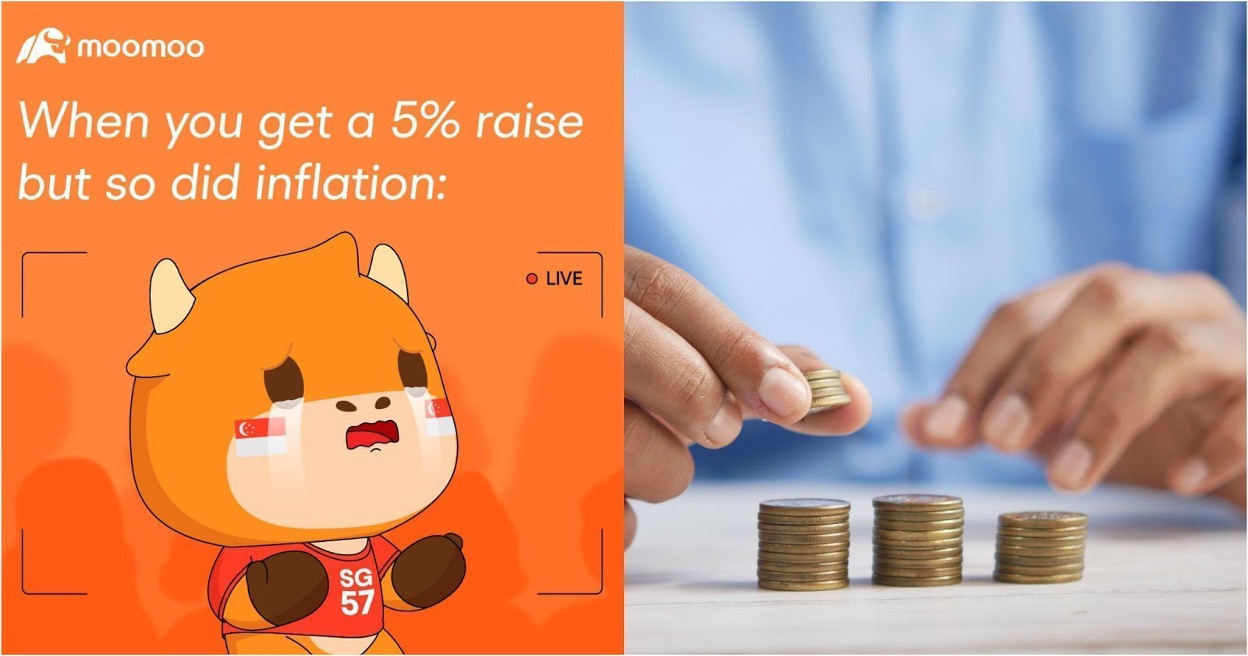There have been several recent news reports about the rise in inflation, particularly core inflation in Singapore.
From 2.9 per cent in March, to a near 14-year high of 5.1 per cent in August.
It doesn’t seem like the problem will go away anytime soon. Instead of ignoring the issue, the best thing would be to prepare for it.
The natural instinct of some people during times of high inflation would be to spend prudently and save their money. But while you’re cutting costs and tightening your belt, think twice before giving up your investment plans as well.
Your savings are at risk in a time of high inflation, as they lose value in “real terms”, if inflation keeps rising at a rate higher than the interest your bank offers. This would mean you’ll be able to buy less with the same amount of money.
According to the International Monetary Fund, “To the extent that households’ nominal income, which they receive in current money, does not increase as much as prices, they are worse off, because they can afford to purchase less. In other words, their purchasing power or real—inflation-adjusted—income falls.”
Bear in mind, this does not mean you should stop saving, or withdraw all your money. Having sufficient savings is always a wise precaution in case of emergencies.
But it does mean that if you have enough disposable income during these tough times, investing wisely may be able to help you grow your portfolio, and possibly hedge against inflation.
Singapore Savings Bonds
No, this has nothing to do with rescuing James Bond from a life-and-death situation.
You may have heard of the Singapore Savings Bonds, available for investment.
They are a special type of Singapore Government Securities with features that make them suitable for individual investors, according to the Monetary Authority of Singapore.
They cost a minimum of S$500 per bond, and the maximum is S$200,000. A bond can be held for up to 10 years. Only people aged 18 and above may invest in these bonds.
The rates offered on these bonds are based on the average Singapore Government Securities yields the month before.Interest rates increase each year.
At the point of issuance, interest rates for the entire 10-year term are fixed and locked in. There is no penalty for early withdrawal, but the longer you hold on to the bond, the higher the interest rate grows.
As they are backed by the government, they represent a safer investment for those who are more risk-averse. The interest rates may also be higher than those offered by a bank.
On the other hand, bonds are often issued with limited amounts each month, and if oversubscribed, you will need to jostle with others to get your hands on one.
High yield savings account
If the biggest issue with a bank savings account in a time of high inflation is the relatively low interest rate, you may want to consider a high yield savings account.
According to Investopedia, such accounts have become more common as more banks offer online accounts and compete for customers.
Such accounts may offer an interest rate that’s higher than that of a traditional savings account. In that case, it may be enough to keep up with surging inflation.
Fixed annuity
You may be familiar with this product in terms of insurance plans.
A fixed annuity promises to pay the customer a guaranteed interest rate, based on their contributions to the account. It can be structured in different ways, such as over 20 years.
The drawback of a fixed annuity is the interest rate may not change much over the years, so it may earn less if inflation rises to extreme levels.
It is also fairly illiquid, and may not allow you to withdraw the money whenever you want.
Exchange Traded Funds
Exchange Traded Funds (ETFs) are similar to mutual funds, a basket of securities which can track the returns of a particular sector (i.e. tech), commodity (i.e. oil) or an index (i.e. SP 500).
However, unlike mutual funds, they can be purchased and sold on a stock exchange, hence the name. Also unlike mutual funds, the price of an ETF’s shares will fluctuate throughout the trading day as shares are bought and sold on the market.
An ETF offers more customisation, as you can invest in things you have more knowledge about. For example, if you closely follow news and industry developments related to the tech sector, you can find an ETF that tracks that particular sector.
It is also more liquid, allowing you to invest and withdraw your money relatively easily. However, it is more reactive to sudden changes in the stock market.
moomoo Cash Plus
This investment product is offered by moomoo Singapore, and allows you to invest in cash management funds in U.S. dollars or Singapore dollars, to generate potential returns for your “idle” cash.
By investing just S$100 into moomoo Cash Plus, you can get up to S$2* cashback every day, for a maximum of S$60.
Customers will earn approximately 2.5^ per cent per annum on their investment.
However, Cash Plus funds are not principal guaranteed, which means there is a possibility of losing whatever amount of money you put in.
 Pic from moomoo
Pic from moomoo
Again, it all comes down to your own personal risk appetite. Find out more about moomoo Cash Plus here.
Invest wisely
During this period of uncertainty, you may be feeling anxious and worried about the state of the economy.
While there is no surefire way to get rich, members of the public should also not be deterred from taking their first steps into the world of investing. While all investments carry a certain degree of risk, not every product has a high level of volatility.
With a bit of research, you’ll be able to find an investment product that suits your needs and risk appetite.
^The indicative 7-day annualized yield is derived from the past performance of money market funds on moomoo cash plus and should not be viewed as an indicator of future results.
*T&Cs apply. This sponsored article is in collaboration with moomoo Singapore. This advertisement has not been reviewed by the Monetary Authority of Singapore.
Top image from moomoo and Unsplash.
If you like what you read, follow us on Facebook, Instagram, Twitter and Telegram to get the latest updates.
